Christ M., Kenig C.E., Sadosky C. Harmonic Analysis and Partial Differential Equations: Essays in Honor of Alberto P. Calderon
Подождите немного. Документ загружается.


264
Chapter 16: Estimates for Elliptic Equations in Unbounded Domains
u(x) < u(xa) = u(2.\ - xl, x').
(16.2)
The point xA is the reflection of x in the plane {x1 = A}. This then yields
the xl-monotonicity of u for xl < 0, and also the symmetry about {x1 = 0}.
For if we let A -4 0 in (16.2) we find that
u(xl, x') < u(-xl, x')
if xl < 0 . (16.3)
However, we can replace xl by -x1 in the equation, use (16.3) again, and
conclude that equality must hold in (16.3). Since the direction xt is arbitrary,
radial symmetry of u then follows.
To prove (16.2) one uses the maximum principle.
In Ea the function
v(x) = u(x") satisfies the same equation
Ov+f(v)=0.
Subtracting this from the equation for u one finds readily that
W,\(X) := u(x) - v(x)
satisfies
Awa + ca (x) wA = 0
in Ex,
wa
0
on 8E,\
(16.4)
Here Ica(x)l < k, the Lipschitz constant of f. If the maximum principle were
to hold we could conclude that wa < 0 in EA and (16.2) would be proved.
However, one cannot be sure that the maximum principle holds, since about
the coefficient cA we only know that it is in L°°. To prove that wa < 0 in
LA, one first considers 0 < A + R small; the domain Ea is then narrow in
the x1-direction, and this is a classical sufficient condition for the maximum
principle. So in this case, w,, < 0 in Ea. Now one moves the plane {x1 = A}
to the right, and one has to show that for every ) in (-R, 0), wa < 0 in
Ea. For this, the argument in [14], as in [17], uses the Hopf Lemma and a
version of it at a corner. Berestycki and I [8] have given a different proof
which avoids the use of the Hopf Lemma. It enables one to prove symmetry
and monotonicity in some direction even for domains with no smoothness
requirements on the boundary. Another method, the Sliding Method, was
also used by us to prove monotonicity.
In connection with questions concerning regularity of free boundaries,
Berestycki, Caffarelli, and I were led to extend the symmetry and monotonic-
ity results to various unbounded domains. This chapter is devoted to some
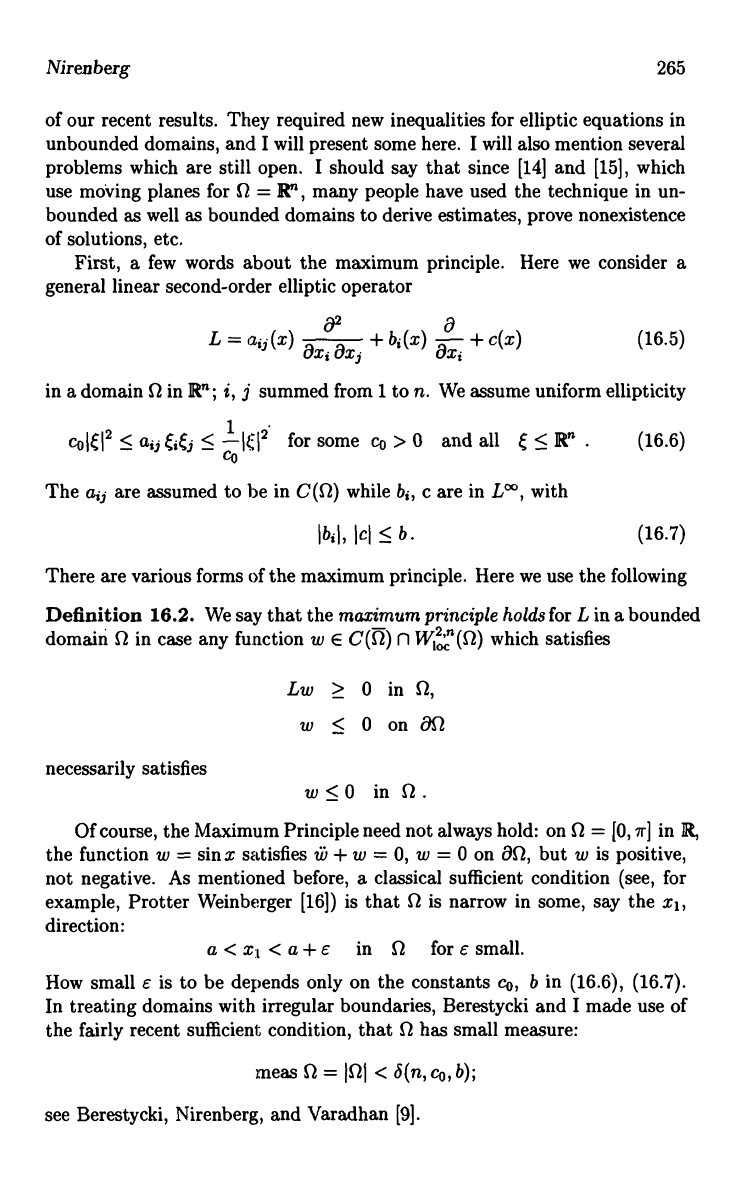
Nirenberg
265
of our recent results. They required new inequalities for elliptic equations in
unbounded domains, and I will present some here. I will also mention several
problems which are still open. I should say that since [14] and [15], which
use moving planes for 0 = R", many people have used the technique in un-
bounded as well as bounded domains to derive estimates, prove nonexistence
of solutions, etc.
First, a few words about the maximum principle. Here we consider a
general linear second-order elliptic operator
L = 1213 (x)
8x; 8x
+ b; (x) a
=_
+ c(x)
(16.5)
in a domain 52 in RI; i, j summed from 1 to n. We assume uniform ellipticity
cofC1Z < a;j t;;l;j <
1
It 12
Co
for some co > 0
and all
1: < R'
. (16.6)
The aid are assumed to be in C(i) while b;, c are in L°°, with
1b;4, IcI < b.
(16.7)
There are various forms of the maximum principle. Here we use the following
Definition 16.2. We say that the maximum principle holds for L in a bounded
domain 52 in case any function w E C(Sl) fl Wig (52) which satisfies
Lw > 0
in 52,
w < 0 on 85t
necessarily satisfies
w<0 in Q.
Of course, the Maximum Principle need not always hold: on 52 = [0, 7r] in 7R,
the function w = sin x satisfies zo + w = 0, w = 0 on 852, but w is positive,
not negative. As mentioned before, a classical sufficient condition (see, for
example, Protter Weinberger [16]) is that Cl is narrow in some, say the x1,
direction:
a < x1 < a + e in Cl for a small.
How small e is to be depends only on the constants co, b in (16.6), (16.7).
In treating domains with irregular boundaries, Berestycki and I made use of
the fairly recent sufficient condition, that Cl has small measure:
meas Cl = I52I < b(n, co, b);
see Berestycki, Nirenberg, and Varadhan [9].
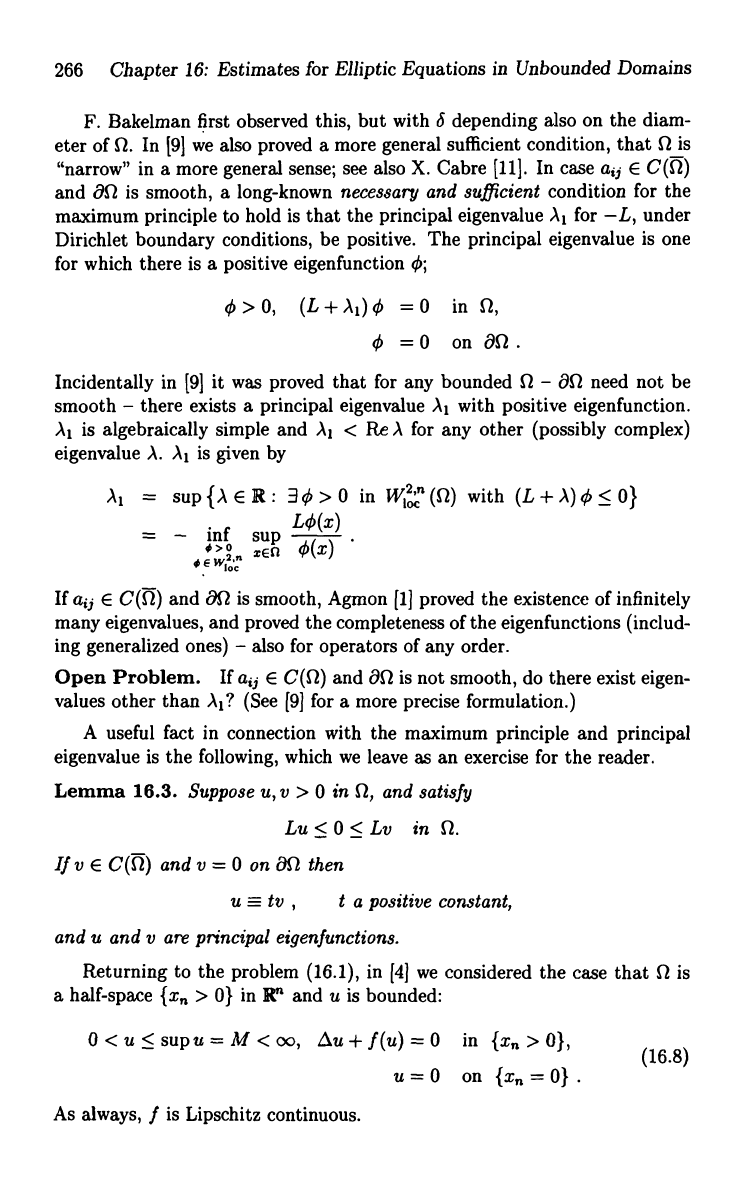
266
Chapter 16: Estimates for Elliptic Equations in Unbounded Domains
F. Bakelman first observed this, but with 6 depending also on the diam-
eter of Q. In [9] we also proved a more general sufficient condition, that fl is
"narrow" in a more general sense; see also X. Cabre [11]. In case aid E C(ii)
and 8i is smooth, a long known necessary and sufficient condition for the
maximum principle to hold is that the principal eigenvalue A for -L, under
Dirichlet boundary conditions, be positive. The principal eigenvalue is one
for which there is a positive eigenfunction 0;
¢ > O, (L + 11) 4' = 0
in Sl,
=0 on Oci.
Incidentally in [9] it was proved that for any bounded 0 - 8S2 need not be
smooth - there exists a principal eigenvalue al with positive eigenfunction.
Al is algebraically simple and A < Re A for any other (possibly complex)
eigenvalue A. \1 is given by
al = sup {A ER: 30> 0 in Wi2° (S2) with (L + A) 0 < 0}
inf
sup
LO(x)
0>0
'En O(x)
0EW'0
If aid E C(S2) and 0^9 is smooth, Agmon [1] proved the existence of infinitely
many eigenvalues, and proved the completeness of the eigenfunctions (includ-
ing generalized ones) - also for operators of any order.
Open Problem. If aij E C(i) and 8S2 is not smooth, do there exist eigen-
values other than A1? (See [9] for a more precise formulation.)
A useful fact in connection with the maximum principle and principal
eigenvalue is the following, which we leave as an exercise for the reader.
Lemma 16.3. Suppose u, v > 0 in 9, and satisfy
Lu < 0 < Lv in 12.
If v E C(N) and v = 0 on dSl then
u = tv ,
t a positive constant,
and u and v are principal eigenfunctions.
Returning to the problem (16.1), in [4] we considered the case that S2 is
a half-space {x > 0} in fit' and u is bounded:
0 < u < sup u = M < oo, Du + f (u) = O
in {x>0},
u=O on {x,s=0}.
(16.8)
As always, f is Lipschitz continuous.
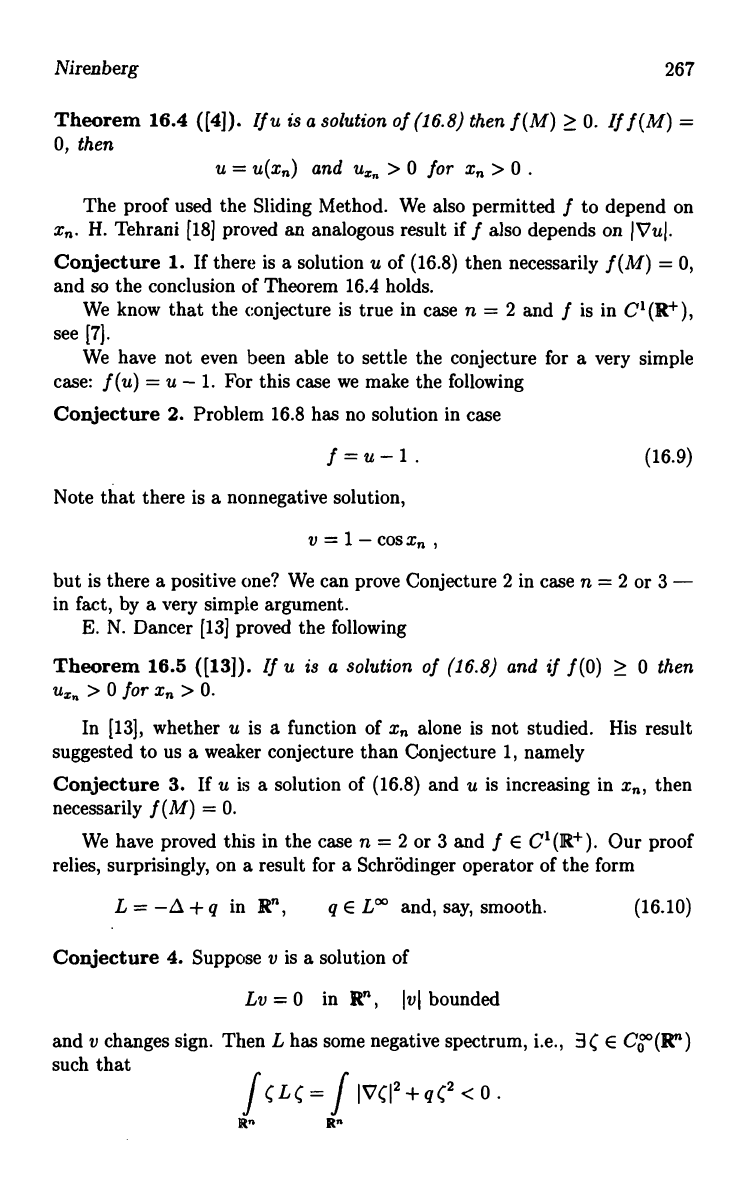
Nirenberg
267
Theorem 16.4 ([4]). If u is a solution of (16.8) then f (M) > 0. If f (M) _
0, then
u = u(xn) and u2,, > 0 for xn > 0 .
The proof used the Sliding Method. We also permitted f to depend on
xn. H. Tehrani [18] proved an analogous result if f also depends on Jvul.
Conjecture 1. If there is a solution u of (16.8) then necessarily f (M) = 0,
and so the conclusion of Theorem 16.4 holds.
We know that the conjecture is true in case n = 2 and f is in C'(R),
see [7].
We have not even been able to settle the conjecture for a very simple
case: f (u) = u - 1. For this case we make the following
Conjecture 2. Problem 16.8 has no solution in case
f =u-1 .
Note that there is a nonnegative solution,
v=1-cosxn,
(16.9)
but is there a positive one? We can prove Conjecture 2 in case n = 2 or 3 -
in fact, by a very simple argument.
E. N. Dancer [13] proved the following
Theorem 16.5 ([13]). If u is a solution of (16.8) and if f (0) > 0 then
uxn > 0 for x, > 0.
In [13], whether u is a function of xn alone is not studied. His result
suggested to us a weaker conjecture than Conjecture 1, namely
Conjecture 3. If u is a solution of (16.8) and u is increasing in xn, then
necessarily f (M) = 0.
We have proved this in the case n = 2 or 3 and f E C'(R ). Our proof
relies, surprisingly, on a result for a Schrodinger operator of the form
L = -0 + q in Rn, q E L°° and, say, smooth.
(16.10)
Conjecture 4. Suppose v is a solution of
Lv = 0
in W,
JvJ bounded
and v changes sign. Then L has some negative spectrum, i.e., 3 ( E Co (R")
such that
fCL(=JIV(l2+q2<0.
Rn
Rn
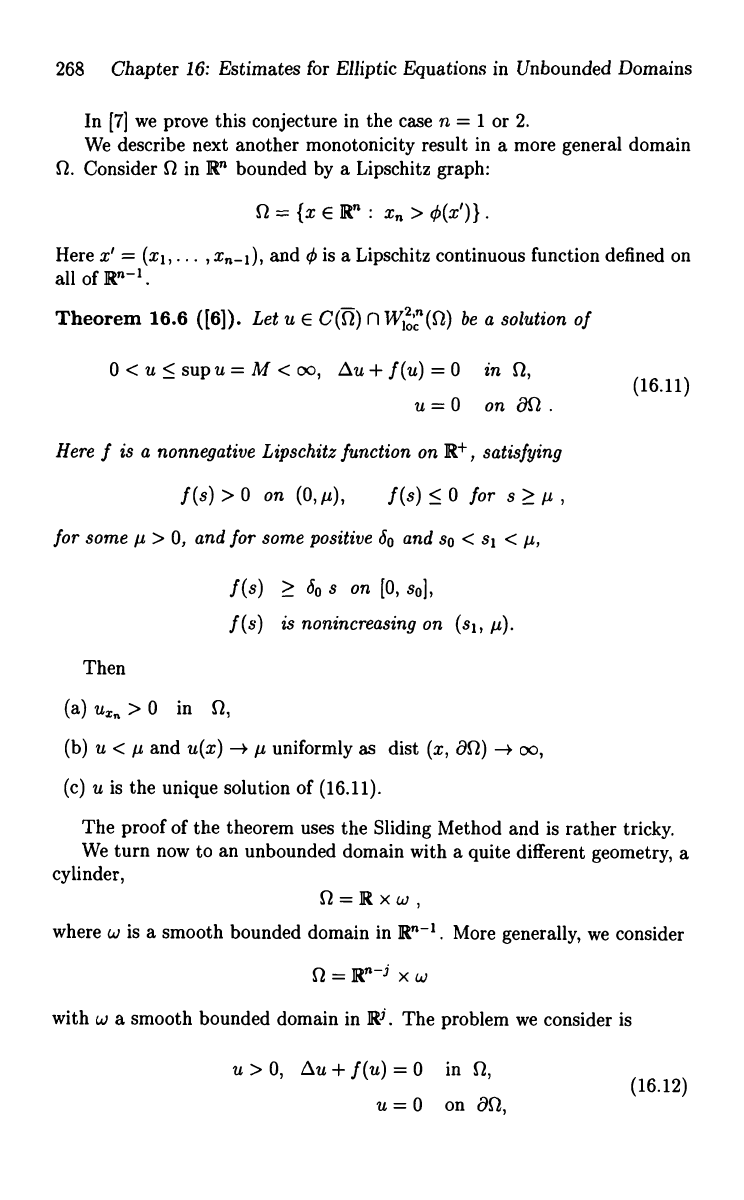
268 Chapter 16: Estimates for Elliptic Equations in Unbounded Domains
In [7] we prove this conjecture in the case n = 1 or 2.
We describe next another monotonicity result in a more general domain
Q. Consider S2 in R" bounded by a Lipschitz graph:
Sl = {x E 1R'
: x > O(x')}.
Here x' = (x1,...
xn-1), and ¢ is a Lipschitz continuous function defined on
all of 1Ri-1.
Theorem 16.6 ([6]). Let u E C(52) fl Woc (52) be a solution of
O < u < sup u = M < oo, Du + f (u) = 0
in Q,
u=0
on 852.
Here f is a nonnegative Lipschitz function on R+, satisfying
f(s)>0 on (0,p),
f(s)<0 for s>µ,
for some p > 0, and for some positive 6o and so < Si
<
f (s) > ao s on [0, so],
f (s) is nonincreasing on (si, µ).
Then
in
52,
(b) u <.a and u(x) -* p uniformly as dist (x, 852) -> co,
(c) u is the unique solution of (16.11).
The proof of the theorem uses the Sliding Method and is rather tricky.
We turn now to an unbounded domain with a quite different geometry, a
cylinder,
52=Rxw,
where w is a smooth bounded domain in R-',
.
More generally, we consider
52=1[Yn-J xw
with w a smooth bounded domain in Rx. The problem we consider is
u>0, Du + f (u) = 0 in 52,
(16.12)
U = 0
on 852,
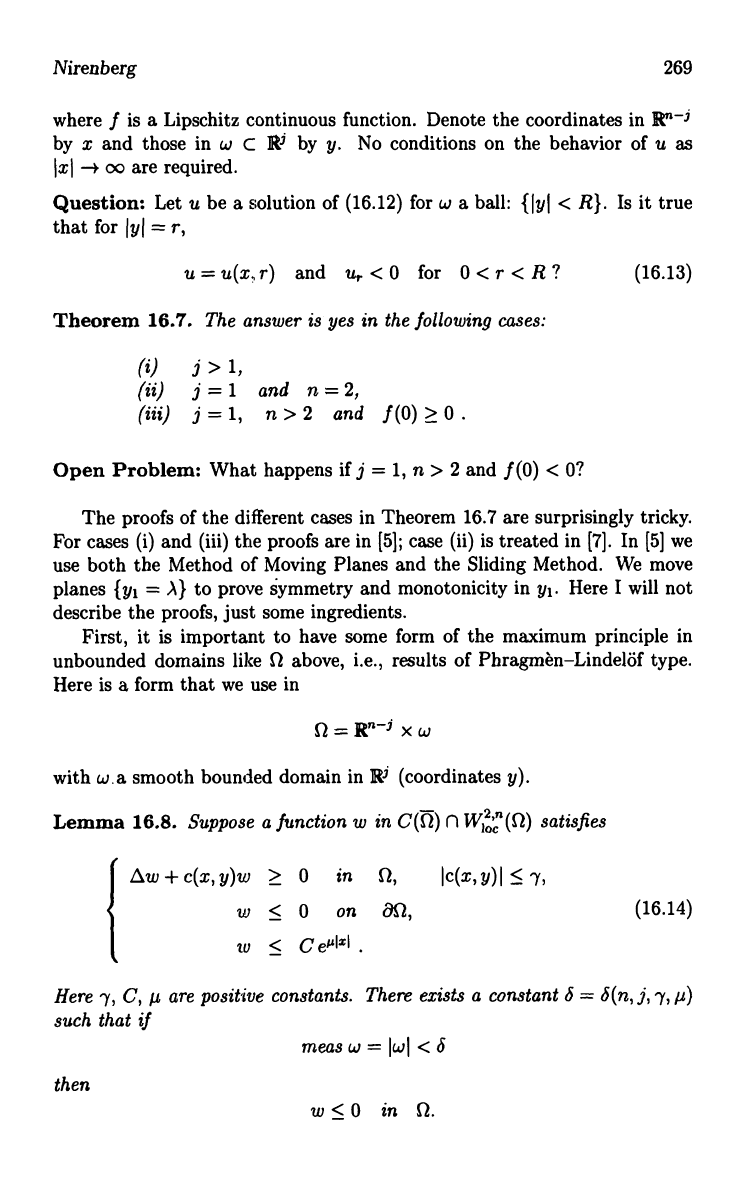
Nirenberg 269
where f is a Lipschitz continuous function. Denote the coordinates in Rn-i
by x and those in w C RR by y. No conditions on the behavior of u as
IxI -+ oo are required.
Question: Let u be a solution of (16.12) for w a ball: fl yf < R}. Is it true
that for Iyi = r,
u = u(x,r) and u,. < 0
for
0 < r < R ? (16.13)
Theorem 16.7. The answer is yes in the following cases:
(i)
j>1,
(ii)
j=1 and n=2,
(iii) j=1, n>2 and f (0) > 0 .
Open Problem: What happens if j = 1, n > 2 and f (0) < 0?
The proofs of the different cases in Theorem 16.7 are surprisingly tricky.
For cases (i) and (iii) the proofs are in [5]; case (ii) is treated in [7]. In [5] we
use both the Method of Moving Planes and the Sliding Method. We move
planes {yl = A) to prove symmetry and monotonicity in yl. Here I will not
describe the proofs, just some ingredients.
First, it is important to have some form of the maximum principle in
unbounded domains like (I above, i.e., results of Phragmi n-Lindelof type.
Here is a form that we use in
52=R7-' x w
with w.a smooth bounded domain in RR (coordinates y).
Lemma 16.8. Suppose a function w in C(S2) fl W,o, (52) satisfies
Ow +
c(x, y)w > 0
in
52,
w < 0
on 852,
w < C
eµlx1
.
Ic(x,y)I <_'Y,
(16.14)
Here ry, C, µ are positive constants. There exists a constant 6 = 6(n, j, y, ,u)
such that if
measw=lwl <6
then
w < 0
in
Q.
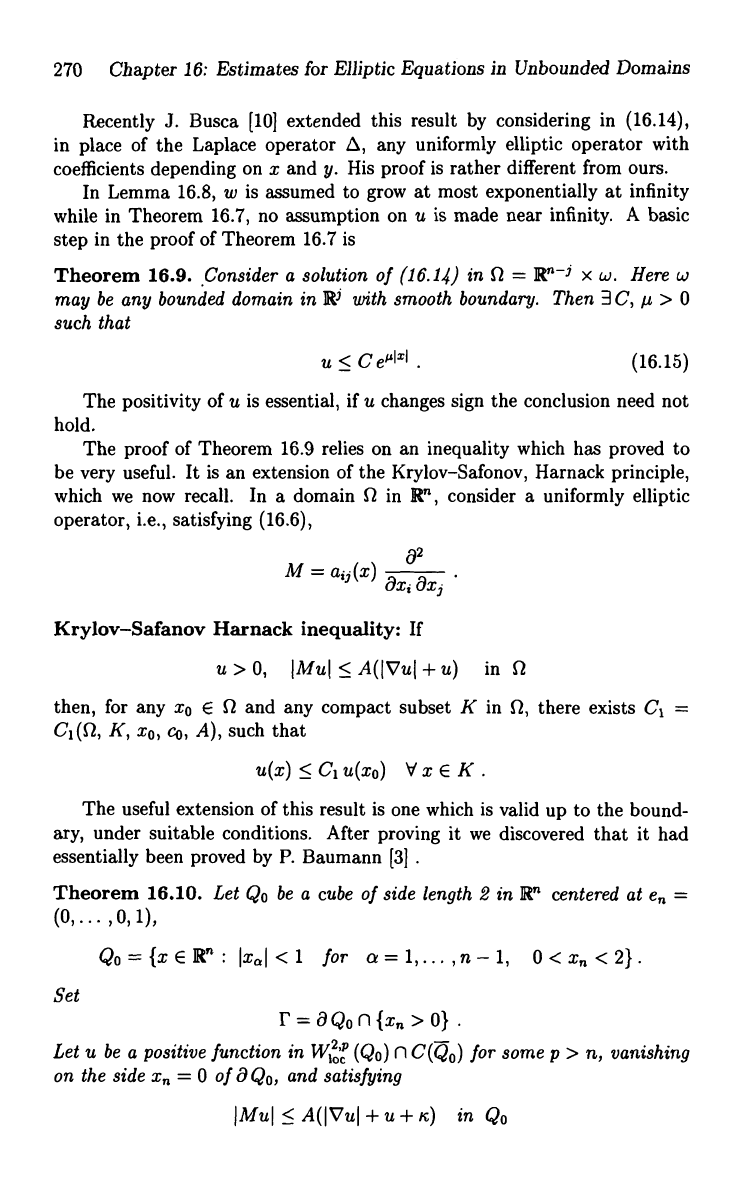
270
Chapter 16: Estimates for Elliptic Equations in Unbounded Domains
Recently J. Busca [10] extended this result by considering in (16.14),
in place of the Laplace operator A, any uniformly elliptic operator with
coefficients depending on x and y. His proof is rather different from ours.
In Lemma 16.8, w is assumed to grow at most exponentially at infinity
while in Theorem 16.7, no assumption on u is made near infinity. A basic
step in the proof of Theorem 16.7 is
Theorem 16.9. Consider a solution of (16.14) in H = RI-i x w. Here w
may be any bounded domain in RR with smooth boundary. Then 3C, It > 0
such that
u < Ce"IxI .
(16.15)
The positivity of u is essential, if u changes sign the conclusion need not
hold.
The proof of Theorem 16.9 relies on an inequality which has proved to
be very useful. It is an extension of the Krylov-Safonov, Harnack principle,
which we now recall. In a domain S2 in R", consider a uniformly elliptic
operator, i.e., satisfying (16.6),
02
M = aii (x)
ax; ax;
Krylov-Safanov Harnack inequality: If
u > 0, !MuI < A(tVuj + u) in S2
then, for any xo E SZ and any compact subset K in Sl, there exists C1 =
C1(SZ, K, xo, co, A), such that
u(x) < C1 u(xo)
d x E K .
The useful extension of this result is one which is valid up to the bound-
ary, under suitable conditions. After proving it we discovered that it had
essentially been proved by P. Baumann [3]
.
Theorem 16.10. Let Qo be a cube of side length 2 in R" centered at en, _
(0".. , 0' 1),
Qo={xER": jxaj<1
for a=l,... n-1, 0<x"<2}.
Set
r=8Qon{x">0}
.
Let u be a positive function in Wrap (Qo) n C(Q0) for some p > n, vanishing
on the side x" = 0 of OQo, and satisfying
jMuI <A(IDuj+u+,c)
in Qo
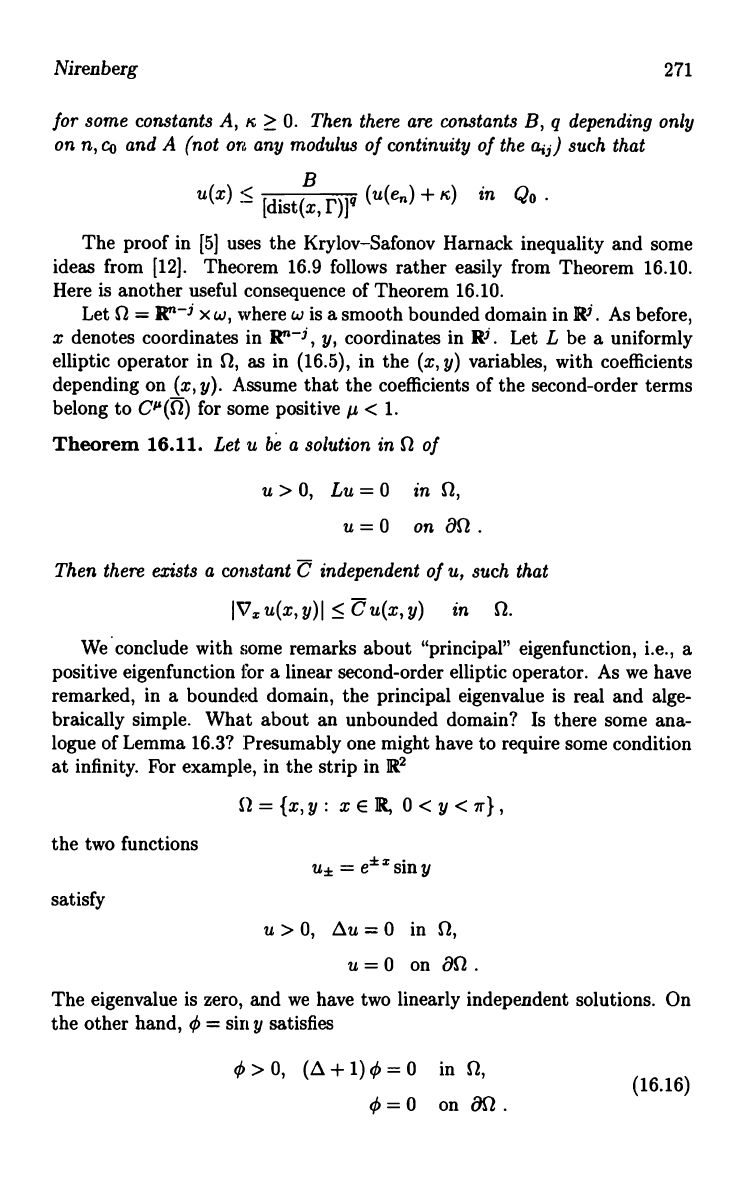
Nirenberg
271
for some constants A, r, > 0. Then there are constants B, q depending only
on n, co and A (not on any modulus of continuity of the a;j) such that
u(x) <
B
[dist(x, F)]Q
r.)
in Qo
The proof in [5] uses the Krylov-Safonov Harnack inequality and some
ideas from [12].
Theorem 16.9 follows rather easily from Theorem 16.10.
Here is another useful consequence of Theorem 16.10.
Let St = R"-' x w, where w is a smooth bounded domain in R'
. As before,
x denotes coordinates in R"-' , y, coordinates in R' .
Let L be a uniformly
elliptic operator in St, as in (16.5), in the (x, y) variables, with coefficients
depending on (x, y). Assume that the coefficients of the second-order terms
belong to Cµ(52) for some positive p < 1.
Theorem 16.11. Let u be a solution in S2 of
u>0, Lu=0
in 1,
u=0 on OSZ.
Then there exists a constant C independent of u, such that
Vxu(x,y)I <Cu(x,y)
in Q.
We conclude with some remarks about "principal" eigenfunction, i.e., a
positive eigenfunction for a linear second-order elliptic operator. As we have
remarked, in a bounded domain, the principal eigenvalue is real and alge-
braically simple. What about an unbounded domain? Is there some ana-
logue of Lemma 16.3? Presumably one might have to require some condition
at infinity. For example, in the strip in R2
SZ={x,y: xER, 0<y<ir},
the two functions
satisfy
u±=e}tsiny
u>0, Au=0 in Q,
u=0 on Ol.
The eigenvalue is zero, and we have two linearly independent solutions. On
the other hand, 0 = sin y satisfies
c5>0, (A+1)q=0
in 1,
(16.16)
0=0 on acl.
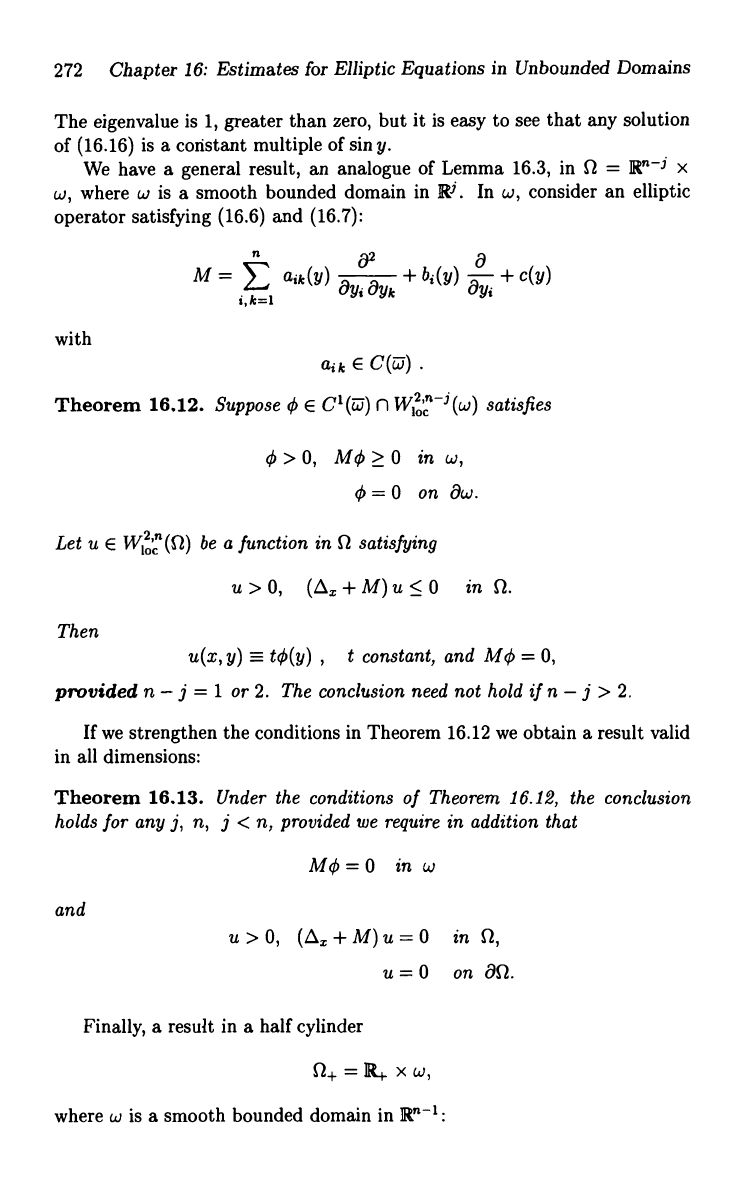
272
Chapter 16: Estimates for Elliptic Equations in Unbounded Domains
The eigenvalue is 1, greater than zero, but it is easy to see that any solution
of (16.16) is a constant multiple of sin y.
We have a general result, an analogue of Lemma 16.3, in SZ = 1[Z'
x
w, where w is a smooth bounded domain in R. In w, consider an elliptic
operator satisfying (16.6) and (16.7):
+ bi(y) j + c(y)
M=
aik (y)
ay
8
i 8yk
8ys
i k=1
with
aikCC(W).
Theorem 16.12. Suppose 0 E C1(w) n W,2,,, ,n-j(w) satisfies
0>0, M¢>0 in w,
¢ = 0 on 8w.
Let u E Way (52) be a function in 52 satisfying
u>0, (Ox+M)u<0 in Q.
Then
u(x, y) - tcb(y) , t constant, and MO = 0,
provided n - j = 1 or 2. The conclusion need not hold if n - j > 2.
If we strengthen the conditions in Theorem 16.12 we obtain a result valid
in all dimensions:
Theorem 16.13. Under the conditions of Theorem 16.12, the conclusion
holds for any j, n, j < n, provided we require in addition that
MO=O in w
and
u>0, (Ax+M)u=0 in Il,
u = 0 on 852.
Finally, a result in a half cylinder
x
52 IR
w,
+= +
where w is a smooth bounded domain in R"-1:
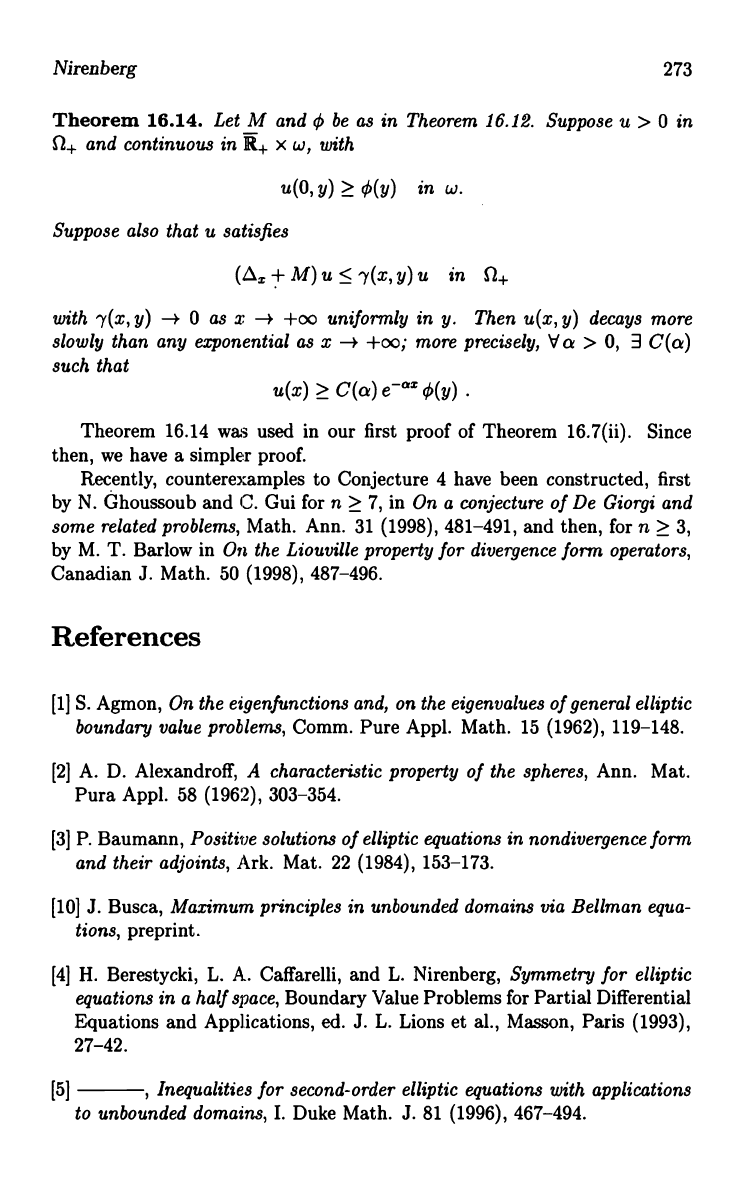
Nirenberg
273
Theorem 16.14. Let M and 0 be as in Theorem 16.12. Suppose u > 0 in
SZ+ and continuous in R+ x w, with
u(O,y) > 5(y)
in w.
Suppose also that u satisfies
(A.+M)u <'y(x,y)u
in St+
with y(x, y) -+ 0 as 2: -+ +oo uniformly in y. Then u(x, y) decays more
slowly than any exponential as x -+ +oo; more precisely, d a > 0, 3 C(a)
such that
u(x) > C(a) e-' 0(y)
Theorem 16.14 was used in our first proof of Theorem 16.7(ii).
Since
then, we have a simpler proof.
Recently, counterexamples to Conjecture 4 have been constructed, first
by N. Ghoussoub and C. Gui for n > 7, in On a conjecture of De Giorgi and
some related problems, Math. Ann. 31 (1998), 481-491, and then, for n > 3,
by M. T. Barlow in On the Liouville property for divergence form operators,
Canadian J. Math. 50 (1998), 487-496.
References
[1] S. Agmon, On the eigenfunctions and, on the eigenvalues of general elliptic
boundary value problems, Comm. Pure Appl. Math. 15 (1962), 119-148.
[2] A. D. Alexandroff, A characteristic property of the spheres, Ann. Mat.
Pura Appl. 58 (1962), 303-354.
[3] P. Baumann, Positive solutions of elliptic equations in nondivergence form
and their adjoints, Ark. Mat. 22 (1984), 153-173.
[10] J. Busca, Maximum principles in unbounded domains via Bellman equa-
tions, preprint.
[4] H. Berestycki, L. A. Caffarelli, and L. Nirenberg, Symmetry for elliptic
equations in a half space, Boundary Value Problems for Partial Differential
Equations and Applications, ed. J. L. Lions et al., Masson, Paris (1993),
27-42.
[5] , Inequalities for second-order elliptic equations with applications
to unbounded domains, I. Duke Math. J. 81 (1996), 467-494.
